|
Phénix Les Poules ambiences magnétiques AM 176 CD Sampling everyday sounds while electronically mixing them with extended and unusual techniques; the Montreal-based Les Poules produces music that is both subtly feminist and sonically expressive. On their own, each of Les Poules (“the hens” in English) – alto saxophonist Joane Hétu, percussionist Danielle Palardy Roger and sampler-manipulator Diane Labrosse – also composes for dance and theatre companies and performs with such associates as guitarist Fred Frith (Roger); pianist Marilyn Lerner (Labrosse) and saxophonist Jean Derome (Hétu). Arriving at their second decade as a trio however, “Phénix” is an unbeatable demonstration of their interactive prowess. Over the course of 24 miniatures, lasting from barely a minute to slightly less than three, the trio creates unique juxtapositions that for example contrast the percussiveness of bass drum thumps and a sewing machine motor; or alternately compare approximations of infant cries, the power of a passing freight train and the rattling of a bell tree. Mostly narrowing her focus to timbres scraped and scratched on cymbals, Roger’s abrasions dovetail with the shrill reed bites, unattached mouthpiece peeps and wide-vibrato growls that Hétu forces from her horn. Meantime Labrosse’s ring-modulator flanging, droning loops of buzzing static and motor-driven grinding underline or connect the shifting tonal centres. With each woman vocalizing a babble of nonsense syllables, gargles, scat singing, snores and juicy quacking, the jocular result is as much musique de maison as musique concrète. In short Phénix is one hen party you’d be well-advised to attend. Ken Waxman Concert Note: Diane Labrosse will join Marilyn Lerner in “Seconde Nature” at The Music Gallery on February 20. |
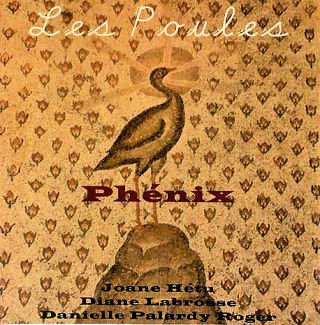 |
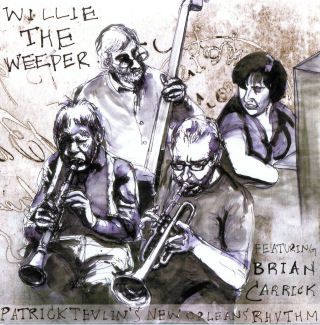 |
Willie the Weeper Patrick Tevlin’s New Orleans Rhythm New Orleans North CD-008 Some of the delights of any art form lie in the rich diversities to be found. Jazz has evolved into a multi-faceted sophisticated culture, but the simple joys of the music in its early form can still be heard, thanks to small, dedicated groups of musicians all over the world. This recording features three stalwarts of the Toronto traditional scene: Patrick Tevlin on trumpet, Roberta Hunt on piano and Colin Bray on bass, all of them members of the popular Toronto group, The Happy Pals. They are joined by Brian Carrick one of England’s leading New Orleans style clarinet players with a strong George Lewis influence. This music is unpretentious and sincere and, in truth, at its most enjoyable when heard live. That’s the case with any music, but none more so than traditional jazz with its direct emotional communication with the audience. That is not to detract from the listening pleasure to be found in this CD which is a collection of mostly familiar traditional themes like the title song, Willie The Weeper, I’m Confessin’ and Martha along with a few lesser known pieces such as the old rag, Trombonium, the 1924 Armand Piron Bright Star Blues and, adding a Jamaican touch, the 1925 Sly Mongoose. The musicians convey an infectious enthusiasm and lovers of traditional jazz will find much to enjoy in this recording. Jim Galloway |
Extended Play – LOCAL JAZZ
By Ori Dagan
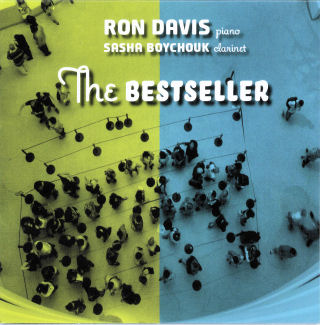 |
The artistry of Ron Davis is revealed not solely by his playfulness on the piano, but all the more by his creative decisions as leader. Davis has achieved critical acclaim for his pristine presentation of, and devotion to, the jazz tradition. On The Bestseller (Minerva/Davinor 233377), his sixth recording, he has pared it way down. Aside from two solo piano tracks, this is an entire album of piano/clarinet duets with Sasha Boychouk, a formidable Ukrainian musician who has recently relocated to Canada. Playing with remarkable virtuosity and a fine sense of humour, Boychouk is an ideal musical match for Davis. In addition to nine collaborative interludes, the original material is mostly penned by Davis, with several gems worth citing: Rhythmaron plants a fresh twist on the Gershwin standard I Got Rhythm, Allelujah is a luminous, pensive waltz and Street Stomp is the Klezmer answer to Dancing in the Streets. For good measure, a few covers, including the Sesame Street/Muppet Show anthem Manha Manha. Humorous, bold, engaging and energetic, “The Bestseller” is a sure-fire winner. (www.rondavismusic.com) |
| Known for his fiery tone and flair for burning tempi, Juno award winner Kirk MacDonald is one of Canada’s pre-eminent jazz saxophonists. Since the release of his first album nearly twenty years ago, MacDonald has gradually gravitated towards the strength of his own original compositions. Family Suite (Romhog Records 116), MacDonald’s sixth album as leader, is a personal affair. The poignant opening and closing theme, Dark Autumn, refers to the fall of 2002, an arduous time in which MacDonald lost his mother while still mourning the deaths of long-time collaborators Jerry Fuller and Joe Bendzsa. Each movement in the suite is meaningfully titled and dedicated. One of the liveliest, Four Shades of Light, features an electrifying tête-à-tête between the leader and Barry Romberg on drums, as well as Romberg trading fours with the exquisite Brian Dickinson on piano. Along with bassist Jim Vivian, the sensitive rhythm section is as good as it gets. Musically multifaceted as always, MacDonald delivers a highly rewarding, emotionally raw performance on this unquestionably cathartic recording. (www.kirkmacdonald.com) | 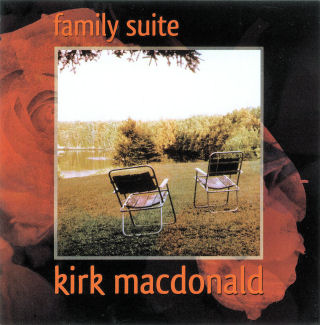 |
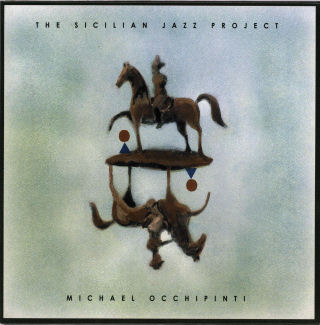 |
A first-rate guitarist, composer and arranger, Michael Occhipinti is best-known for co-leading the spirited NOJO (Neufeld-Occhipinti Jazz Orchestra) and has also previously released four titles under his own name. His 2000 release, “Creation Dream”, offered jazz renditions of Bruce Cockburn’s music. Conceptually similar, Occhipinti’s ambitious fifth outing The Sicilian Jazz Project (True North Records TND 516), pays tribute to his roots by reinventing traditional Sicilian folk repertoire. The selected material is tastefully steeped in jazz without sacrificing its authentic folk flavour. Occhipinti’s arrangements emphasize strings and percussion, along with Kevin Turcotte on trumpet, Louis Simao on accordion and Ernie Tollar on saxophone and flute. Five of the nine tracks feature heartfelt vocals by Dominic Mancuso and Maryem Tollar, both impeccable storytellers. Brother Roberto Occhipinti lays down the bass and wears the producer’s hat. Ultimately what comes through in this recording is a deep dedication to the material. Extensive liner notes effectively introduce the listener to each song’s meaning, origin and the leader’s intention. If one is of Sicilian lineage, this recording is essential; for everyone else, it is a recommendable labour of love. (www.michaelocchipinti.com) |
| The elder brother of Michael and a cousin of guitarist David, Roberto Occhipinti has enjoyed a productive career primarily as bassist, secondarily as producer. Initially mentored by Joel Quarrington and Dave Young, he spent decades as an orchestral player and sideman before releasing his first album as leader at the turn of the century. Occhipinti’s fourth release, A Bend in the River (Alma Records ACD11182), showcases his refined skills as player, producer, arranger and composer. The core personnel consists of pianist David Virelles, drummer Dafnis Prieto, Occhipinti on bass and Luis Deniz on alto saxophone. Collectively the group outlines each composition’s shape, but the canvas is splashed with many other colours, including guest appearances by flautist Les Allt, bass clarinettist John Johnson, trumpeter Kevin Turcotte and a full string orchestra on three of the seven cuts. The title track is a memorable standout for its logically flowing melody, sweeping harmonic movement and a rhythmically inventive saxophone solo by Deniz. Occhipinti’s string arrangements, especially those featuring the Globalis String Orchestra, create a lush lyricism that lingers long after the disc plays out. (www.robertoocchipinti.com) | 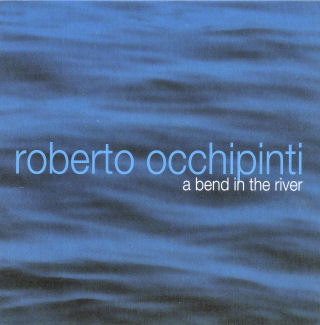 |
Extended play – VOCAL JAZZ
By Cathy Riches
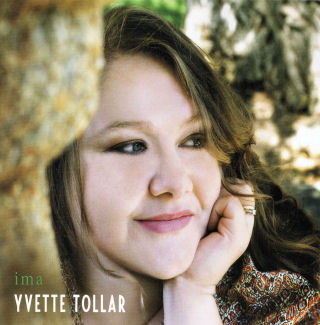 |
A passel of new discs by Canadian singers – some relative newcomers, others more experienced – ended off 2008 in style. The first, and most notable, is by Yvette Tollar, an independent release entitled Ima (ROM 10). The Tollar name may be familiar to some, as brother Ernie is an established woodwind player in Toronto who lends his talents to this collection of Canadian songs. Most are written by local players like keyboardist Dave Restivo (the gorgeous Prayer for Human Kindness appears twice on the disc, once with just piano accompaniment and the other with nimble tabla playing by Ravi Naimpally), guitar guru Kevin Breit and Tollar herself, but Joni Mitchell’s Edith and the Kingpin is also here and given a funky but reverential treatment. Tollar sings with a jazz sensibility underpinned with a gospel/soul sound that makes for a rich, appealing combination. But what is most compelling is her complete lack of affectation. She is a singer who has chosen and written songs that have a lot of meaning for her and while she takes care with her craft, it’s apparent her main aim is to get the songs across rather than to sound a certain way. Having some of the heaviest and most inventive players in Toronto collaborating on your disc helps too – the aforementioned Kevin Breit and Dave Restivo, piano player Robi Botos and Tollar’s husband and phenomenal bassist, Rich Brown, played and co-produced. It all adds up to one of the most genuine and moving discs from a local talent in 2008. (www.yvettetollar.com) |
| Montreal-based Susie Arioli and partner Jordan Officer have released their 5th CD Night Lights (Spectra Musique SPECD7806). Officer’s steady acoustic guitar comping and agile soloing along with Arioli’s light touch on snare, gives it a Hot Club of France sound, while the blend of sophisticated nostalgia and French and Latin tinges reminds me of the hip, Oregon-based “little orchestra” Pink Martini. The clever way that Arioli’s breathy alto is recorded — close-up, with no reverb — gives the songs an engaging intimacy, as if she’s sitting just over there on the couch doing a few numbers just for you. The phrasing is straight and unadorned on standards like I Can’t Get Started, Blue Skies and You Go to My Head with Officer’s original Basswalk (featuring bassist Bill Gossage) rounding out this breezy, satisfying record. Arioli and Officer are playing several dates in Quebec in February and March and info can be found at www.nuland.ca/arioli. | 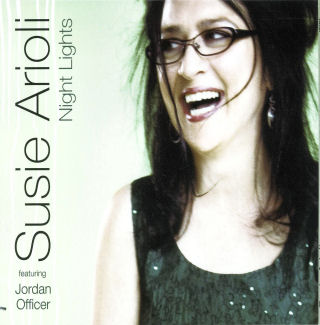 |
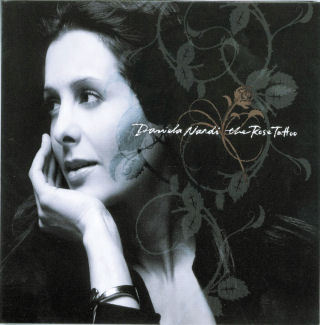 |
Daniela Nardi first graced the Toronto music scene with her personal songwriting style and smooth, earthy voice in 2003, but took a hiatus to nurse her mother through cancer. So it’s no surprise that her second CD Rose Tattoo (MIN003) is rife with self-examination and introspective lyrics. Produced by Greg Kavanagh, the disc is polished and richly arranged — lots of percussion, backing vocals, horns and subtle electronica — but never loses its earnest intensity. Rich Brown and George Koller share bass duties, Davide Direnzo drums and Nardi does the keyboard work. Ranging from the urban funkiness of 485 to the Calabrian folk singing that precedes the touching ballad Rosetta, to the Middle Eastern bluesiness of Longest Road, the record covers diverse musical and emotional ground. (www.danielanardi.com) |
| Two discs with similar offerings — standards played with traditional jazz treatments and instrumentation (no djembe or oud here) and straight forward vocal interpretations — round out the latest batch of releases. First is Molly Johnson’s Lucky (Universal 0251786014). Johnson is a popular singer in Toronto not only for her performances but also her fundraising work and, lately, radio hosting on CBC 2. Her mature, chesty voice imbues the songs on “Lucky” with a world-weariness that makes Lush Life and I Loves You Porgy utterly believable. While swingy, up-tempo treatments — courtesy of backing trio Phil Dwyer, piano and sax, Mike Downes, bass, and Mark McLean/Ben Riley, drums — take the normally sombre Mean to Me and Ode to Billie Joe (which could be renamed Ode to Killer Joe for the debt the arrangement owes to that song) to new, light-hearted places. (www.mollyjohnson.com) | 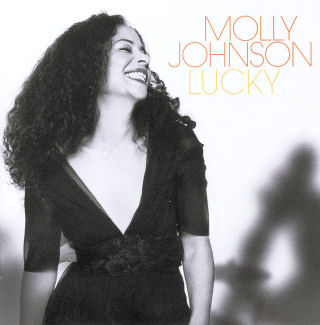 |
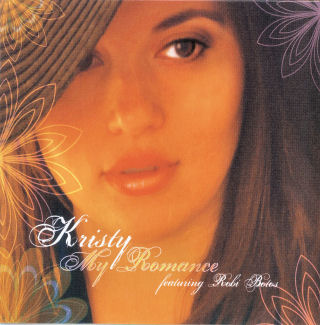 |
Founder of Alma Records and bass player, Peter Cardinali, produced his daughter Kristy’s debut My Romance (Alma Records ACD11082) and for it enlisted Robi Botos’ sensitive support on piano. Kristy croons her way matter-of-factly through such familiar tunes as I Remember You, Taking a Chance On Love and, incongruously for one of such tender years, In the Wee Small Hours of the Morning, with guest bits from renowns Don Thompson on bass, Guido Basso on flugelhorn and Kevin Breit on guitar. The standout track is the almost a capella version of A Sleeping Bee. Uber arranger Dylan Bell’s sumptuous, complex voicings, sung by fellow Cadence members Kevin Fox, Carl Berger and Ross Lynde, add a dash of verve to an otherwise straight forward record. (www.almarecords.com) |
By Ken Waxman
|
Barely four years since its founding, The Association of Improvising Musicians Toronto (AIMToronto), has raised the profile of local improvisers, while nurturing the scene. This almost 200-member, non-profit collective helps find venues in which to hear improvised music – most prominently Somewhere There in Parkdale – presents concerts featuring visiting musicians interacting with locals, and has organized a large improvisers orchestra. One of AIMToronto’s highest profile gigs took place at the Guelph Jazz Festival in 2007, where 18 AIMToronto members played the music of the American improv guru Anthony Braxton with the composer on soprano saxophone. The result was Creative Orchestra (Guelph) (Spool Line SPL 130). It showcases the AIMToronto members following the ever-shifting tonal centres in five Braxton compositions. Throughout these sequences and intervals it’s evident that overtones and undertones are as audible as the melodies, so the aural coloration takes on a 3-D-like effect. Germane to these tracks are the bravura contributions of vocalist Christine Duncan, who personifies the program not only with guttural or bel canto warbling plus inflated or truncated syllables, but also with parlando declarations. Another connecting thread is percussive – with strokes, vibrations and rattles apparent in varied pitches and pressures from Nick Fraser’s and Joe Sorbara’s drums and Brandon Valdivia’s clattering xylophone. Most characteristic of the pieces is Composition 307, a variation of sprechstimme, with Duncan’s falsetto dramatics sharing space with antiphonal vamps from the horns or gong-ringing and rim shots from the percussion. As the resonance arranges itself architecturally, slurs, syllables and sequences peep from the layering, with particularly noteworthy contributions from tenor saxophonist Colin Fisher, growls from Ronda Rindone’s clarinet and Scott Thomson’s shaggy trombone triplets. (www.spoolmusic.com) |
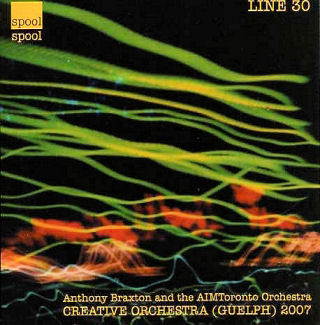 |
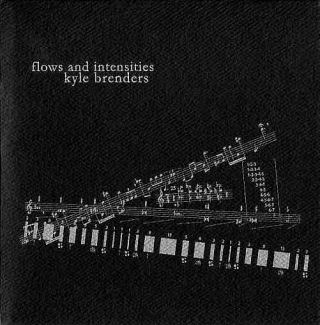 |
The Orchestra’s artistic director, saxophonist Kyle Brenders, studied with Anthony Braxton at Wesleyan University and his recording Flows and Intensities suggests one of Braxton’s solo outings. Each of the eight compositions – all but two by Brenders – is oriented around a specific theme or motif played on soprano or tenor saxophone. Working with extended reed techniques and circular breathing, the results are alternately pretty or gritty. Not conventionally “pretty” however, since the modus operandi involves chunky air blown through the horns’ body tubes, echoing ghost notes, adagio pitch-sliding plus extended meditative and undulating textures where audible air intake alternates with flutter tonguing. Repetition of selected clusters or tones are part of the strategy as are times where Brenders seems to be playing two parallel reed lines – one consisting of puffing notes, the other ornamenting them with ghost tones. (www.aimtoronto.org) |
| Another alumnus of the orchestra’s Guelph foray is guitarist Ken Aldcroft, whose solo guitar lexicon on VoCaBuLaRy (Trio Records TRP-SS01-008) is as varied as Brenders’ is for saxophone. Using diverse tunings, the guitarist’s distinctive flattish tone makes full use of flanging and reverb. Some tracks become exercises in controlled feedback, others are built around metallic micro tones and snapping flat picking. Sometimes his spiky runs reference Monkish licks; other times, loops, claw-hammer banjo tones or serrated rock-music extensions are present. Like Brenders he creates a call-and-response pattern as if a guitar duo is present. However his repeated phrases often fade into silences or transform themselves into patterns that form a combination of slack-key and microtonal slurs. These spidery, interlaced textures reverberating back onto one another are most accessible on Sterling Road Blues, which matches a non-showy blues progression that emphasizes the bass, with hesitant string-clumping, finally downshifting into ringing, but not reverberating timbres. (www.kenaldcroft.com) | 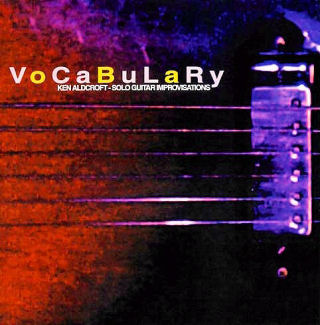 |
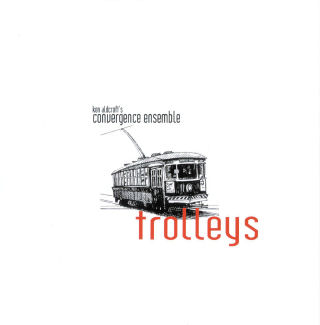 |
Bringing this game plan to group improv, Trolleys (Trio Records TRP-009) finds Aldcroft’s Convergence Ensemble meandering between group and solo work. Trombonist Thomson, alto saxophonist Evan Shaw, drummer Joe Sorbara and bassist Wes Neal join Aldcroft here for an outing where pauses are as much a part of the sound as polyphony, though there are points at which disconnect is evident between soloists and band. Individually each player impresses, especially Sorbara with drum stick nerve beats, thick ruffs and distinct hi-hat bops; Shaw, who undulates accentuated lines with a wide vibrato and snorting obbligatos; plus Thomson’s tongue-blurring plunger work and staccato grace notes. At points the trombonist’s blustery braying corrals the others into a bluesy stop-time amble which moves forward for a period until all the players disperse on individual paths. A rubato near-ballad, Apples showcases the most co-operation, involving multilayered counterpoint from each player. Shaw’s irregularly shaped reed osculation makes common cause with Aldcroft’s rhythmically sophisticated echoing fills, while walking bass propels the intersection of burbling trombone runs and ringing guitar licks. Before the climax, Sorbara gooses the tempo as the piece speedily double then triples in time, adding discursive riffs from Thomson and Shaw. Impressive as part of an orchestra, AIMToronto members are just as estimable individually. |



